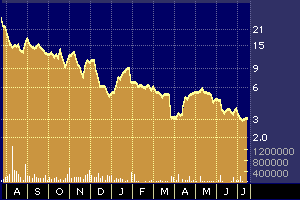
Getting Back to Business in Taiwan
Getting Back to Business in Taiwan
by Hal Plotkin
Silicon Valley Correspondent
Taiwan Semiconductor Manufacturing Co. {TSM} says it has received commitments from local authorities pledging that 85 percent of its electrical power will be restored by this weekend, according to a statement released by the company.
The company posted revenue of $923.3 million for the six months ended June 30, making it the country’s largest semiconductor manufacturer. Philips Electronics owns 28 percent of the company.
Taiwan Semiconductor’s stock price took an immediate hit after Tuesday’s earthquake, which measured 7.6 on the Richter scale. The temblor knocked the company’s manufacturing facility in Taiwan’s Hsinchu Science Park entirely offline.
Taiwan Semiconductor {TSM}
 |
 |
Detailed Quote |
 |
Financial Statement | |
 |
Recent Events | |
 |
Company Snapshot | |
 |
Quarterly Earnings | |
 |
Key Statistics |
How Taiwan’s Quake May Affect U.S. Firms
Like most other major Taiwanese high-tech manufacturers, Taiwan Semiconductor’s emergency generators kicked in immediately after the quake, company officials say, which allowed an orderly shutdown of plant operations and minimized damage to the company’s expensive semiconductor-manufacturing equipment.
Company officials say they’re currently operating with electricity at about 25 percent of normal levels. By rotating the available power from machine to machine, Taiwan Semiconductor workers have been able to begin the necessary task of checking and recalibrating highly sensitive manufacturing equipment, prior to resuming full operations.
“With our own generator power as a supplement, this is adequate to get us up and running,” says Ron Norris, Taiwan Semiconductor senior vice president of worldwide marketing and sales. Nonetheless, company spokesperson Y.C. Huang says the company’s operations in the fourth quarter will be “substantially affected” by the quake.
The selloff in Taiwan Semiconductor’s stock is taking place, despite escalating demand for the products produced by the company and other Taiwanese foundries which, taken together, account for about 12 percent of the world’s supply of computer chips. Overall, 1999 was projected to be a banner year for Taiwanese chip makers. Product revenue is projected to grow by 44.8 percent this year to nearly $4.2 billion, according to the Taiwan-based Industrial Technology and Research Institute.
It’s still not clear how much that projected growth might be affected by the recent quake.
“It’s really too early to tell,” says John Hatch, spokesman for the American Electronics Association, based in San Jose, Calif. “A lot of our [member] companies source products in Taiwan so the level of concern is relatively high.”
Hatch says Taiwan Semiconductor’s statement about the resumption of operations is “an encouraging sign” but that it will be another week or so before the full impact of the quake can be assessed.
“We’re going to stay tuned in,” he says. “We should have a better feel for it soon.”


